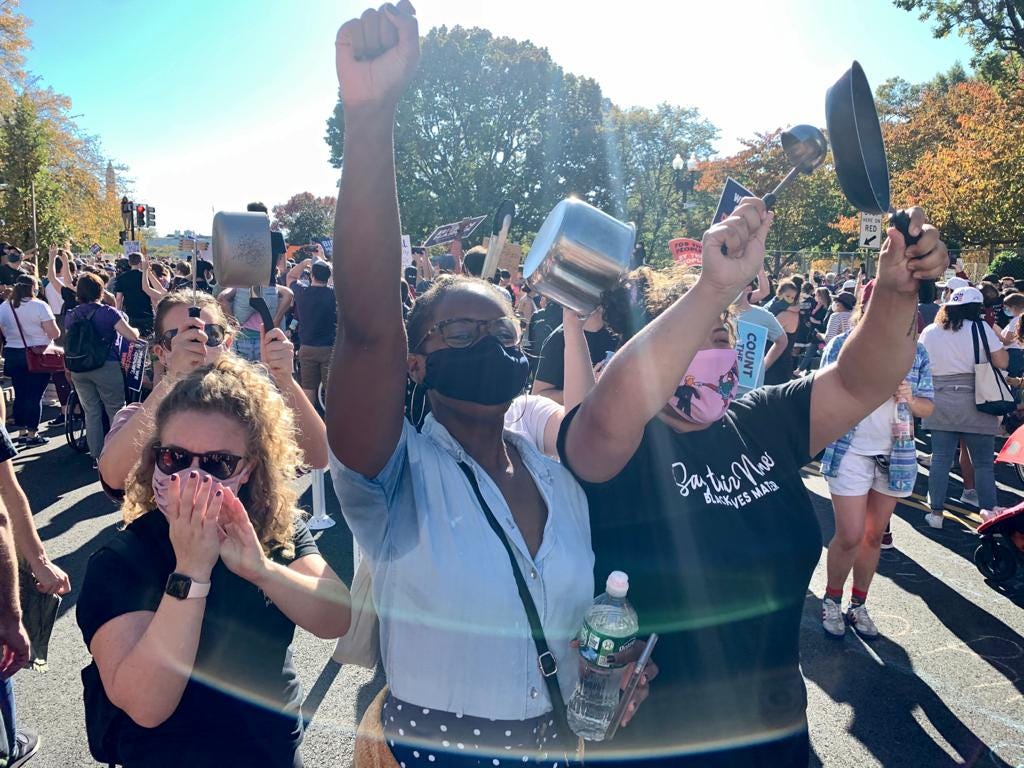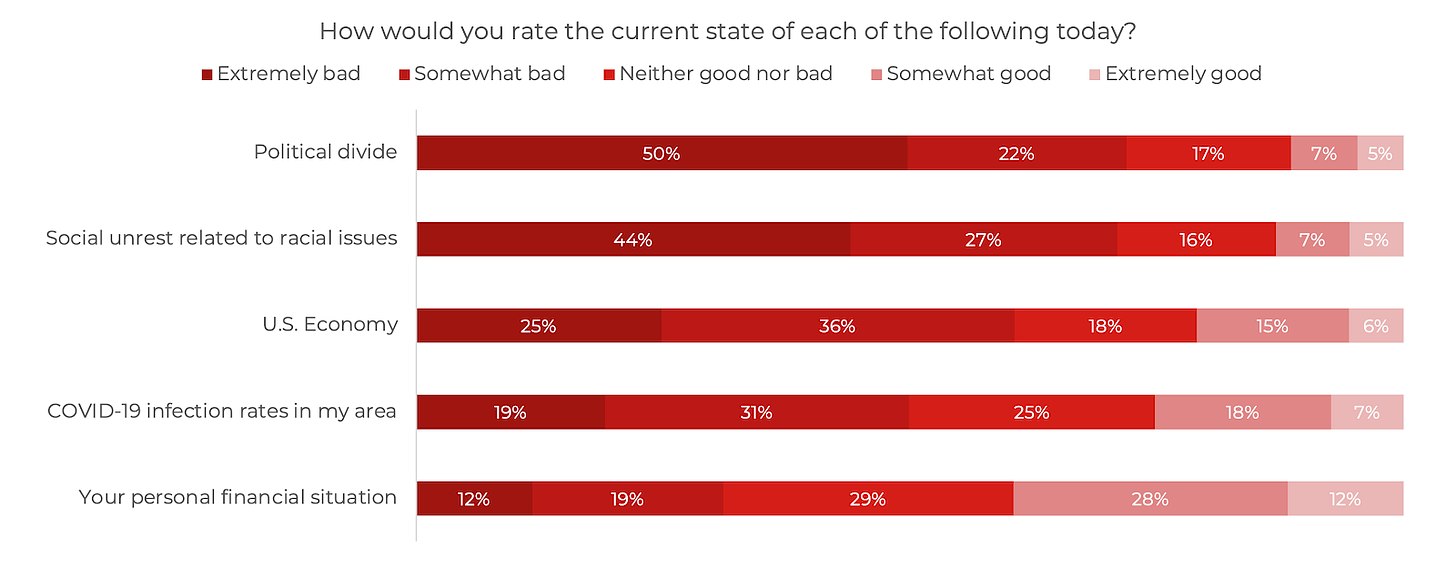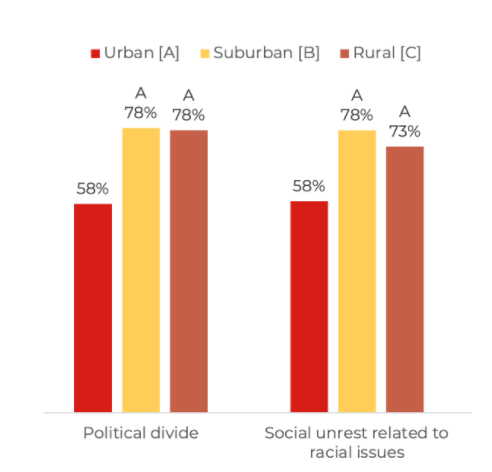Optimism and Anxiety: How the Biden Win and the Vaccine News Have and Haven't Reshaped Q4
I was the first in my household to hear the Joe Biden win on November 8th. When I saw the headline pop up on my computer, I ran up the stairs yelling the news ,and soon we were all cheersing and cheering. For the rest of the weekend, I couldn’t quite believe it, revisiting the map and the electoral college count over and over, waiting for the other shoe to drop. Although there are still legal challenges and lack of concession from the current President, the world suddenly shifted into a new gear, and there was literal dancing in the streets.
DCist’s coverage of the day that Biden won in Washington, DC.
Soon thereafter, Pfizer announced progress on a Covid vaccine. We’ve gotten so used to living with daily case counts, masks and quarantines, and calibrating our entire existence around this disease. This news kicked off another round of hope. Even though the infrastructure to scale and deliver the vaccine is going to take a lot of work, the news was enough to bounce the stock market and show a light at the end of the long tunnel.
Going into Q4, the agency I work for, McKinney, ran an extensive survey to measure the national spirit, one of four waves of research we’ve done since the beginning of quarantine. We called it The Shit Show, because obviously.
The pandemic, the election, and the social unrest in the United States all pointed to rough seas going into what’s usually our most festive time of year. The travel and retail sectors have been struggling throughout 2020, and have been bracing for an unpredictable holiday season. With Covid spikes and a contested election, the grind felt like it would never really let up.
This past weekend provided a glimpse at a different potential future. Joe Biden’s victory as a unity candidate heartened over half of the nation, and people danced in the streets. The report of a potential vaccine from Pfizer buoyed hope. But even with these shifts on the horizon, there’s still a long way to go.
I dug back into our data set to see what popped for me in light of this new, more optimistic, news.
First of all, way back in September, 72% people rated the political division as bad or extremely bad--the issue that rated the worst in our survey. This was true no matter the political leaning, race, or gender. Even though conservatives leaned towards Trump in the election, the unity messaging that Joe Biden ran on and the discipline with which he and the Democratic party showed in not engaging negatively probably won him support in the bitterly divided nation.
The second biggest issue, above Covid, the economy, and personal finances, was the country’s social unrest. After a summer of protests and counter protests kicked off by police killings of Black people, it’s no wonder this was top of mind. Interestingly, we found that social unrest was a bigger concern in suburban and rural areas than it was in urban areas, where most of the unrest was happening. The specter of social unrest encroaching on those areas was more impactful than the experience of it in cities.
Finally, we ran our research at the beginning of Q4, and the threat of Covid was overshadowed by these other two larger issues, along with the US economy. Although the case count was still high, there was a relative plateau in new cases and deaths, as well as in positive developments. As we head into the holidays, cases are spiking again worldwide, raising fears of another lock down and other stricter measures. With the political situation moving into a new phase and social unrest (hopefully) calming, Covid will again take the spotlight.
And yet, uncertainty remains. Most people we surveyed were incredibly uncertain about what the future would hold. With no concession yet from the losing party in the White House and the threat of lawsuits hanging in the air, we’re in a state of limbo as we wait to see what the next day’s headlines will hold. We found that less than 20% of people could claim they felt very confident about what the rest of Q4 might hold. With a legitimate electoral and popular Presidential victory and news of a vaccine, we should be feeling more confident and certain, but, as all things in 2020, uncertainty remains.
If you’re a brand, you are also whipsawing between messaging new optimism and assuaging ongoing anxiety. Consumers still want some relief from the pressures of managing during a pandemic, or a large shift in the political landscape.
If Biden gets ushered in as he was rightfully elected to do, partisanship will remain and one of his big tasks will be unifying a bitterly divided nation. Gap tried their unity messaging with little success, and even Oreo’s cutesy unity campaign felt off in a nation where there’s no love lost between the left and the right. We’re going to be looking at how brands can effectively enter the fray on talking about unity in Q1.
And we’ll still be facing the day-to-day realities of Covid for a while, but we’ll start to see more headlines about vaccine production and other more effective ways of managing the spread. Brands shouldn’t rush too quickly to a world without Covid, as we’re seeing spikes moving into the winter and it’ll take time to roll out a vaccine.
But that sliver of hope can become a beacon for beleaguered consumers, and brands can help them feel a little better.
Some ways brands are innovating:
Chipotle has a new digital kitchen model, where all ordering is digital and there’s no seating. Designed primarily like a ghost kitchen for delivery only, it also has walk up windows for passers-by to order, along with the pumped-up smell of Chipotle. Look for other restaurants to follow suit.
As the United States grows more accepting of the experience of people across the spectrum of gender and sexuality, Citi Bank has announced it will allow trans and non-binary people to use their true name rather than their dead name on Citi accounts and cards.
Beats by Dre does not mince words when it comes to examining the state of race in the United States in its new spot that questions non-Black viewers love of Black culture versus its treatment of Black people. It had Black star power both in front of and behind the camera. Few brands can exercise challenging race at this level; Beats was founded by Dr Dre and has continued its foothold in the Black community.
Thanks for reading! If you’re interested in learning more about this data, and what we do, hit me up. If this was interesting to you, please share.
If you’re not subscribed yet, get more marketing, culture, and social impact thinking in your inbox.





